Good people !!!!
Kagame cannot deny M23 is not of his
making. Kagame is part and parcel
of M23. He is the masterminder and the
financier of M23 with the help of
his unscrupulous Corporate Special
Business Interest.
It is quite unfortunate that in his invation to Congo, he planned to be rich and
build Rwanda through stealing from
Congo. This is unacceptable. Kagame
must be indicted and be charged at the
ICC Hague for conspiring and planning
to ambush, terrorize and kill people of
DR Congo. Kagame and friends must
be charged for genocide.
Justice must be served and be seen to be
to be fair on the Congo People with
its Government.
Justice delayed, is justice denied.
Judy Miriga
Diaspora Spokesperson &
Executive Director for
Confederation Council Foundation for
Africa
USA
email: jbatec@yahoo.com
Casualties as Congo and UN Forces Fight Rebels
Congolese troops came under fire from rebels in the country's volatile east Monday as fighting resumed just outside Goma, a city of nearly 1 million people near the volatile Congolese-Rwandan border, army officials said.
Heavy weapons fire rang out around 4:30 p.m. near the front line just 9 miles (11 kilometers) outside the city.
Hostilities resumed last week after weeks of relative calm, and by Thursday a new United Nations intervention brigade with a stronger mandate than past missions shelled rebel positions for the first time.
Both sides suffered heavy casualties over the weekend, with more than 50 rebels killed and 23 government soldiers dead, according to a doctor near the front line and an army chaplain. Three U.N. peacekeepers were wounded: two South Africans and a Tanzanian, U.N.-backed Radio Okapi reported.
The head of the United Nations mission in Congo, Martin Kobler, visited two hospitals on Sunday and paid his respects to wounded government and U.N. soldiers, hailing them as "heroes fighting to restore peace," Radio Okapi reported.
The Congolese forces have advanced less than a mile (about 2 kilometers) since Wednesday and have yet to achieve their immediate objective — cutting off M23 from a border crossing where the rebel group is believed to get supplies from neighboring Rwanda, say observers.
The Congolese are fighting with the help of a new U.N. intervention brigade, which was created after the M23 rebels invaded and briefly held Goma in November.
The M23 has been pounding Goma from its positions just north of the strategic city, killing civilians in Goma's residential neighborhoods. By Saturday, scores of angry residents took to the streets in protest, claiming that the U.N. had not done enough to protect them. A U.N. car was set on fire, and in the melee two protesters were killed.
Some Goma residents claim the U.N. opened fire on the mob, but the president of Uruguay, Jose Mujica, said in a statement over the weekend that Uruguayan peacekeepers had only fired rubber bullets to control the crowd. Mujica said that it was Congolese police who had used live ammunition.
On Monday, the Congolese government called for an investigation into the deaths of the civilians. Minister of the Interior Richard Muyej told The Associated Press: "We are absolutely in agreement that a joint commission needs to be created" to do that.
Medical services were struggling to cope with the scale of the casualties among government troops and the M23 fighters who launched their rebellion last year and briefly held Goma in November before retreating. Subsequent peace talks in neighboring Uganda have repeatedly stalled.
Dr. Isaac Warwanamiza told The Associated Press he had seen 82 bodies since early Sunday, 23 of whom he claimed were government soldiers, the highest death toll reported since hostilities broke out last week. "I'm overwhelmed by what I've seen: bodies blown apart, arms and feet here and there," he said, speaking by phone from a hospital north of Goma.
Eight of the dead had no uniforms, 23 were government troops and the rest were M23 rebels, the doctor added.
The total of wounded Congolese troops at the military hospital is 720, according to army chaplain Lea Masika.
This is the first time that the Congolese army has been backed by the new U.N. intervention force, which was created in March.
The U.N. brigade was given a mandate to fight the rebels after Goma was seized by the M23 in November. In a humiliating blow to both Congo and the international community, the rebels marched directly past U.N. peacekeepers stationed at the gates of this city. The peacekeepers did nothing to stop them because their mandate at the time was limited to protecting civilians.
The M23 is made up of hundreds of Congolese soldiers, mostly from the Tutsi ethnic group who deserted the national army last year after accusing the government of failing to honor the terms of a deal signed in March 2009. Many of the movement's commanders are veterans of previous rebellions backed by Rwanda, which vigorously denies allegations that it has been supporting and reinforcing the M23.
In Washington, the State Department condemned the actions of the M23, calling on the rebel group to immediately cease hostilities, disarm and disband. The U.S. also suggested that Rwanda is assisting the rebels.
"We urgently call on (Congolese) and Rwandan governments to exercise restraint to prevent military escalation of the conflict or any action that puts civilians at risk," the statement said. "We reiterate our call for Rwanda to cease any and all support to the M23."
United Nations troops accused of killing two civilians in Congo
Demonstrators reportedly killed after car set ablaze and crowd tried to storm UN base in protest at lack of protection
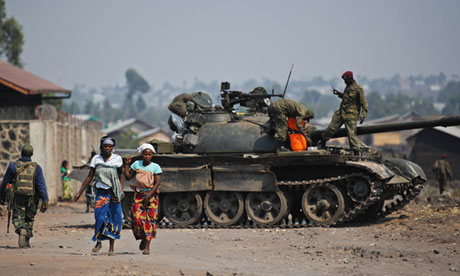
Two Congolese women walk past a government army tank on the outskirts of Goma in the Democratic Republic of Congo. Photograph: Phil Moore/AFP/Getty Images
United Nations troops have been accused of killing two civilians in eastern Democratic Republic of the Congo as the body's first offensive force is dragged into an escalating conflict.
On Saturday, scores of angry residents took to the streets, complaining that the UN had not done enough to protect them. A UN car was set ablaze and, when the crowd allegedly tried to storm a UN base, two protesters were killed.
Witnesses claim that UN troops from Uruguay opened fire on the demonstrators, but the Uruguayan president, Jose Mujica, denied this, insisting that they only fired rubber bullets and it was Congolese police who used live ammunition.
The UN has opened an investigation into the incident, which has
On Saturday, scores of angry residents took to the streets, complaining that the UN had not done enough to protect them. A UN car was set ablaze and, when the crowd allegedly tried to storm a UN base, two protesters were killed.
Witnesses claim that UN troops from Uruguay opened fire on the demonstrators, but the Uruguayan president, Jose Mujica, denied this, insisting that they only fired rubber bullets and it was Congolese police who used live ammunition.
The UN has opened an investigation into the incident, which has
the potential to embarrass the 3,000-strong "intervention brigade" that was created in March and entered combat last week against the M23 rebel movement.
Fighting broke out last Wednesday after weeks of relative calm in and around the eastern city of Goma. The UN troops shelled rebel positions on Thursday but the Congolese government soldiers they are supporting suffered heavy casualties over the weekend, according to an Associated Press report.
Dr Isaac Warwanamiza said he had seen 82 bodies since early on Sunday, 23 of whom he claimed were government troops, the highest death toll reported since hostilities broke out last week. "I'm overwhelmed by what I've seen: bodies blown apart, arms and feet here and there," he said.
Eight of the dead had no uniforms, 23 were government troops and the rest were M23 rebels, the doctor added. The total of wounded Congolese troops at the military hospital is 720, according to army chaplain Lea Masika. Two UN peace enforcers from South Africa and one from Tanzania have also been injured.
The front line of fighting is only nine miles north of Goma. The M23 rebels briefly held the strategic city in November last year and then retreated a few miles away. The Congolese army is yet to achieve its immediate objective of cutting off M23 from a border crossing where the rebel group is believed to receive supplies from neighbouring Rwanda.
On Sunday, the UK pulled its foreign office staff out of Goma due to security concerns.
The US state department said: "We urgently call on (Congolese) and Rwandan governments to exercise restraint to prevent military escalation of the conflict or any action that puts civilians at risk. We reiterate our call for Rwanda to cease any and all support to the M23." Rwanda has repeatedly denied UN allegations that it backs the M23 rebels.
------------------------
26 August 2013 Last updated at 06:00 ET
Share this page
DR Congo unrest: UN investigates Goma protest deaths
 Hundreds of people protested
after rockets killed civilians in Goma
Hundreds of people protested
after rockets killed civilians in Goma
The UN has opened an investigation
into reports that its troops killed two Congolese civilians during protests in
the eastern city of Goma, amid fighting with rebels.
Eyewitnesses told the AFP news agency the two died on Saturday when a crowd tried to storm a UN base and said troops from Uruguay had opened fire.
Uruguay has denied the allegations and blamed the Congolese police.
A new UN intervention brigade is deploying to the area to tackle rebels.
UN troops last week shelled rebel positions just outside Goma.
There has been no official statement on how many people have died in the fighting.
One local doctor has told the AP news agency he had seen 82 dead bodies, including those of 23 government soldiers on Sunday.
"I'm overwhelmed by what I've seen: bodies blown apart, arms and feet here and there," said Isaac Warwanamiza, speaking from a hospital north of Goma.

Many Congolese accuse the 18,000-strong UN mission in the Democratic Republic of Congo of not doing enough to end two decades of conflict in the east of the country.
Hundreds of people reportedly joined Saturday's protests, after rockets killed several civilians in the city, and called for the UN to attack the M23 rebel group.
Augustin Matendo, one of the protesters, told AFP that Uruguayan troops opened fire.
"Two people were killed instantly and four others were injured and rushed to hospital," he told AFP.
Uruguay President Jose Mujica denied the claims.
The UN intervention brigade has the strongest mandate ever given to such a peacekeeping force and is tasked with eradicating the rebel groups which have plagued eastern DR Congo since 1994.
On Sunday, the UK pulled its Foreign Office staff out of the city due to security concerns, while the US condemned the rebel attacks.
In November, the M23 rebels briefly captured Goma, which borders Rwanda, withdrawing in exchange for a series of demands, including negotiations with the government.
Rwanda has repeatedly denied UN allegations that it has been backing the M23 rebels.
Like Rwanda's leadership, M23 fighters mostly come from the Tutsi community.
They deserted from the Congolese army in April 2012, forcing an estimated 800,000 people from their homes in the ensuing unrest in the mineral-rich region.
Peace talks taking place in Uganda this year to resolve their grievances have stalled.
Congo army battles M23 rebels near eastern city of Goma
Kenny
Katombe 1 hour ago
August 26, 2013 (AP)
By Kenny Katombe
GOMA, Democratic Republic of Congo (Reuters) - A U.N. brigade tasked with neutralizing armed groups in Congo has assisted the country's army in clashes with eastern rebels on Monday, ending a brief lull in days of fighting that has killed and wounded dozens.
The violence, the most serious in months, is the first major test for the newly deployed U.N. Intervention Brigade which has an unprecedented mandate to launch military operations against M23, one of the rebels at the heart of nearly two decades of conflict.
A senior officer with the brigade told Reuters that U.N. peacekeepers were "assisting" the Congolese army in operations against M23 rebels late on Monday.
"We are supporting the army in their operations but have not ourselves engaged the rebels at this stage," the officer said by telephone from Goma, requesting not to be identified.
The brigade has fought alongside Congo's army several times since the latest fighting erupted on Wednesday.
The M23 rebels said they were targeted by air strikes and came under heavy weapons fire on Monday afternoon.
"As usual, we expect that ground troops will come in the wake of these bombings," M23 said in a statement. Congo's army said rebels had attacked first and it was retaliating.
Congolese army spokesman Colonel Olivier Hamuli said clashes were taking place at Kibati, about 11 km (7 miles) north of Goma, a city of a million people on the Rwandan border.
The rebels briefly seized Goma in November before withdrawing and committing to Ugandan-hosted peace talks. Negotiations have faltered and renewed fighting has exacerbated tensions between Rwanda and Congo.
Several shells fell in Rwanda during clashes around Goma last week, prompting Kigali to accuse Kinshasa of bombing it. Congo denied the charge and accused Rwandan troops of backing the rebels.
The cross-border accusations underscore the rebellion's roots in a complex web of local politics and regional conflicts over ethnicity, land and minerals. Rwandan troops fought in two Congo wars but Kigali says it is not supporting the M23.
'VERY CHAOTIC'
A doctor at a military hospital near Goma said he was treating those wounded in "ferocious" fighting on Saturday.
"It is very chaotic and difficult to have precise numbers, but we have had around 15 deaths so far. There have also been 150 injuries," the doctor said, asking not to be named.
The doctor and a U.N. official said the rebels, whose positions were struck by U.N. attack helicopters on Saturday, had lost many men in the fighting.
A rebel spokesman denied those reports. "How can we continue to protect our territory while suffering the kinds of losses they are saying? It is nonsense," said spokesman Colonel Vianney Kazarama.
The United Nations said three of its soldiers - two Tanzanians and a South African - were injured on Saturday when a shell landed near their position just north of Goma.
(Additional reporting by Pete Jones in Kinshasa and Peroshni Govender in Johannesburg; Writing by David Lewis and Bate Felix; Editing by Andrew Heavens and Mohammad Zargham)
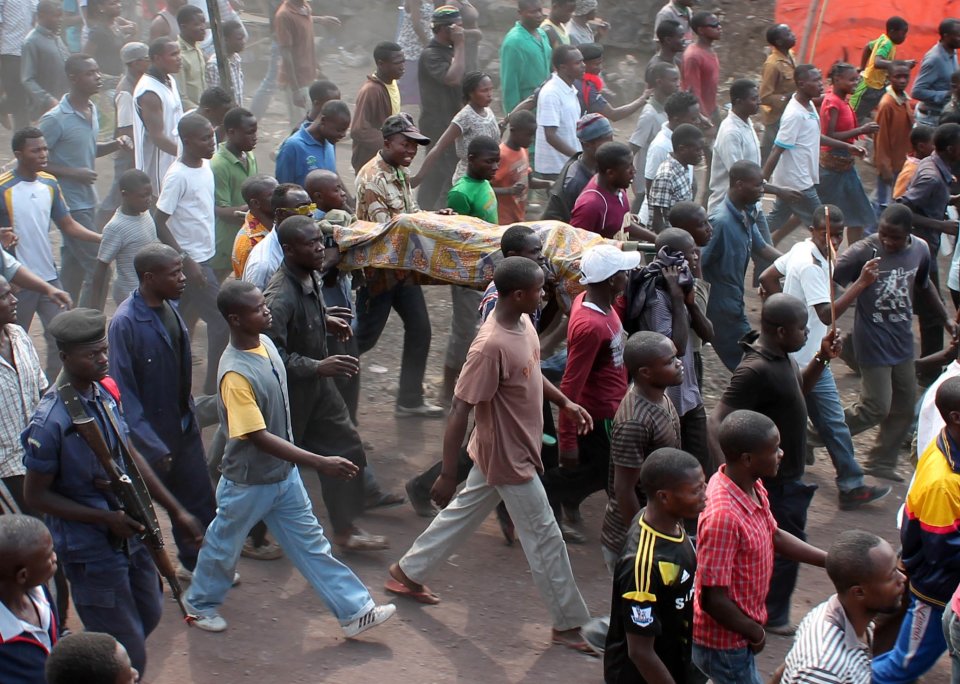
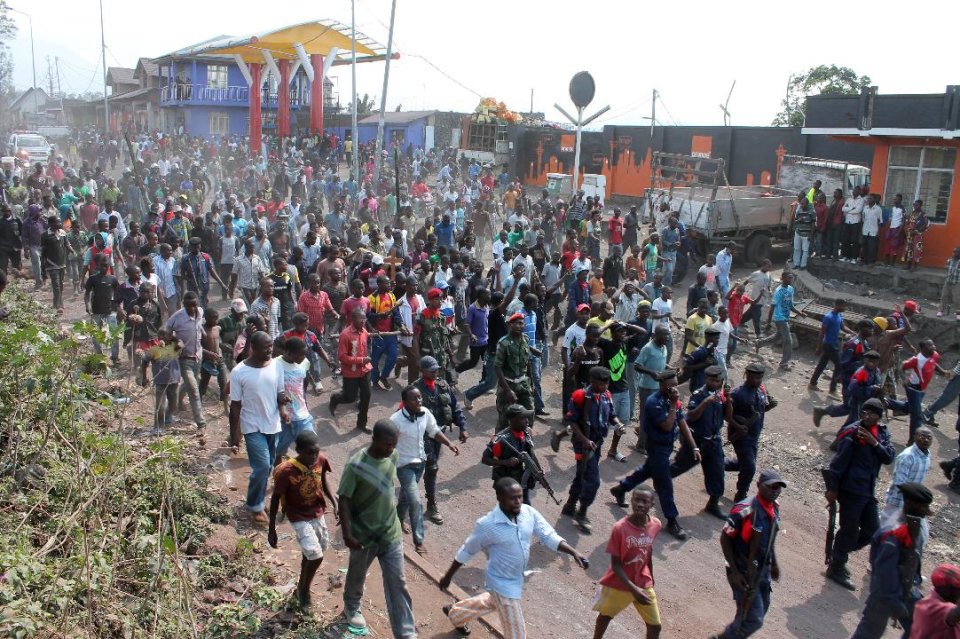
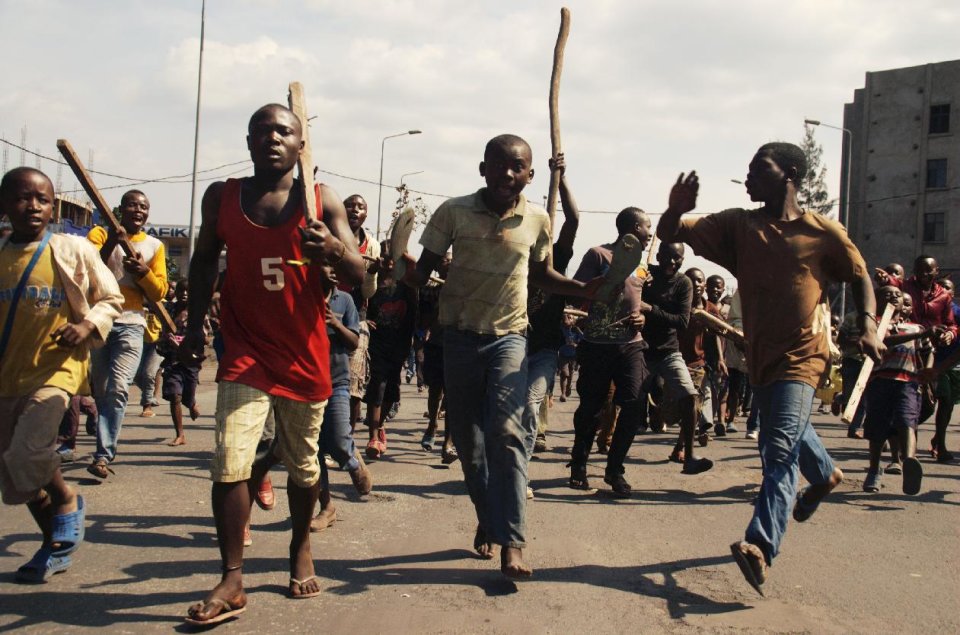
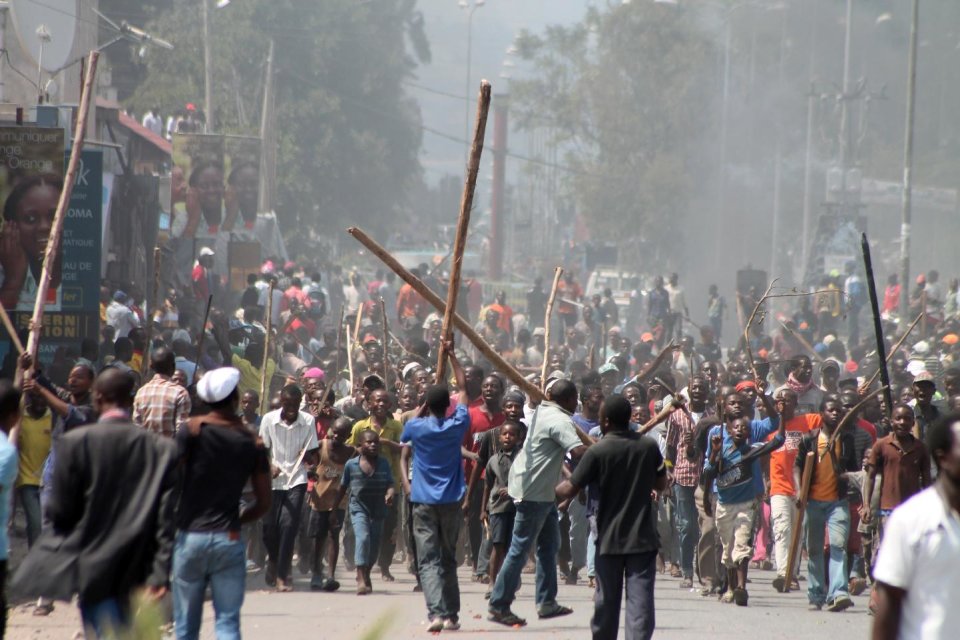
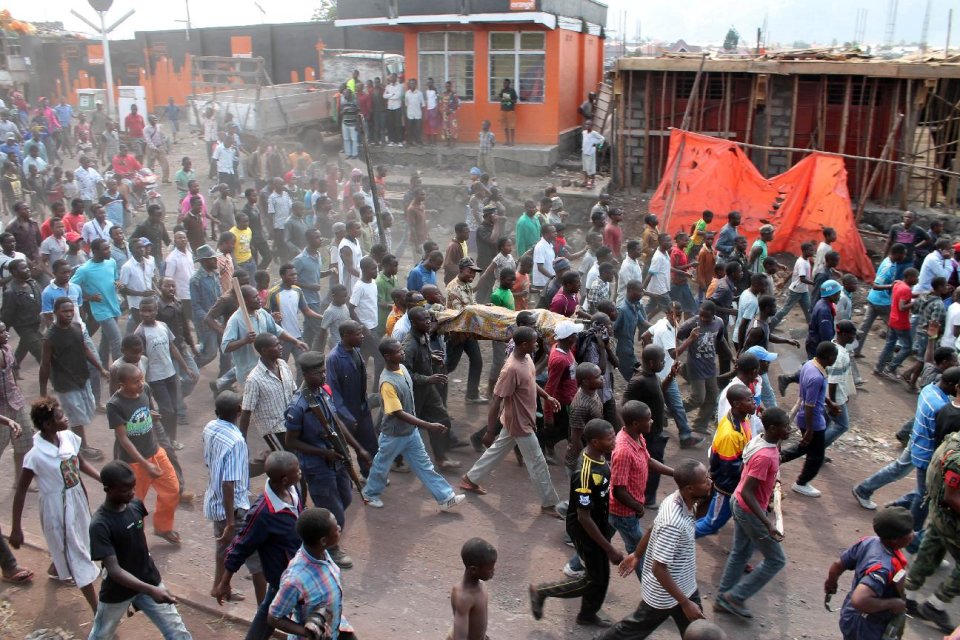
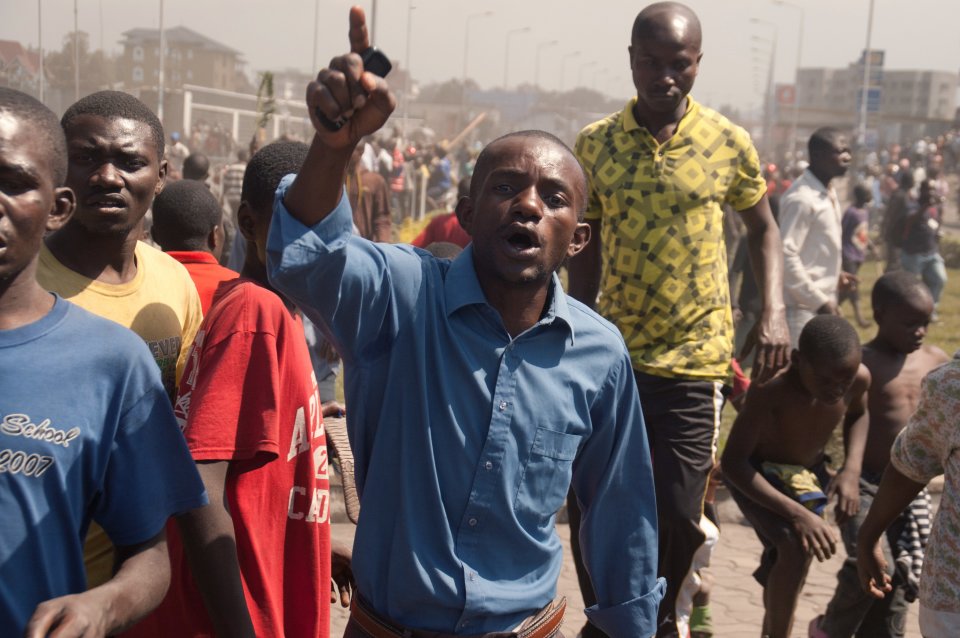
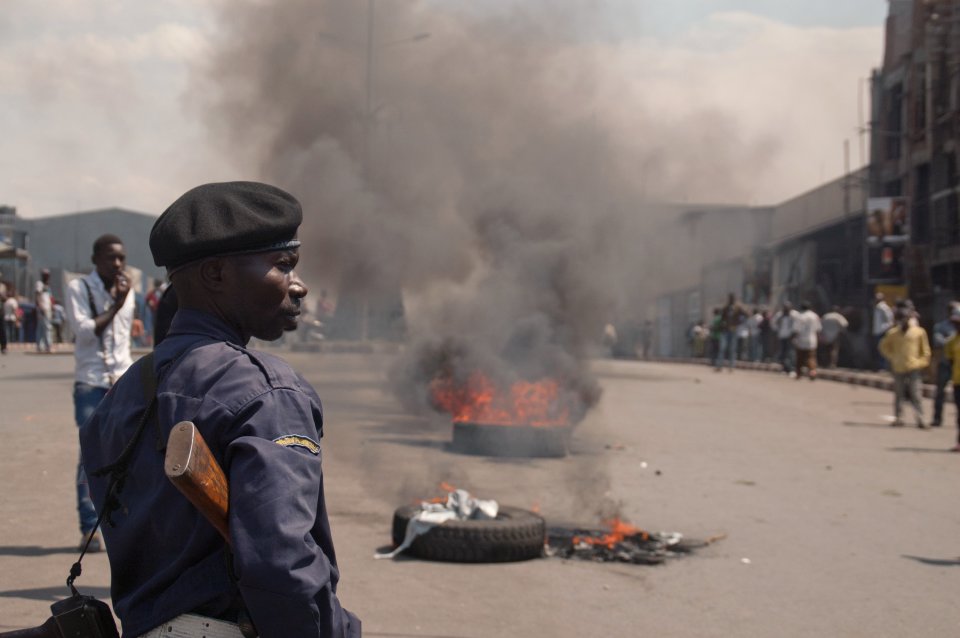
GOMA, Democratic Republic of Congo (Reuters) - A U.N. brigade tasked with neutralizing armed groups in Congo has assisted the country's army in clashes with eastern rebels on Monday, ending a brief lull in days of fighting that has killed and wounded dozens.
The violence, the most serious in months, is the first major test for the newly deployed U.N. Intervention Brigade which has an unprecedented mandate to launch military operations against M23, one of the rebels at the heart of nearly two decades of conflict.
A senior officer with the brigade told Reuters that U.N. peacekeepers were "assisting" the Congolese army in operations against M23 rebels late on Monday.
"We are supporting the army in their operations but have not ourselves engaged the rebels at this stage," the officer said by telephone from Goma, requesting not to be identified.
The brigade has fought alongside Congo's army several times since the latest fighting erupted on Wednesday.
The M23 rebels said they were targeted by air strikes and came under heavy weapons fire on Monday afternoon.
"As usual, we expect that ground troops will come in the wake of these bombings," M23 said in a statement. Congo's army said rebels had attacked first and it was retaliating.
Congolese army spokesman Colonel Olivier Hamuli said clashes were taking place at Kibati, about 11 km (7 miles) north of Goma, a city of a million people on the Rwandan border.
The rebels briefly seized Goma in November before withdrawing and committing to Ugandan-hosted peace talks. Negotiations have faltered and renewed fighting has exacerbated tensions between Rwanda and Congo.
Several shells fell in Rwanda during clashes around Goma last week, prompting Kigali to accuse Kinshasa of bombing it. Congo denied the charge and accused Rwandan troops of backing the rebels.
The cross-border accusations underscore the rebellion's roots in a complex web of local politics and regional conflicts over ethnicity, land and minerals. Rwandan troops fought in two Congo wars but Kigali says it is not supporting the M23.
'VERY CHAOTIC'
A doctor at a military hospital near Goma said he was treating those wounded in "ferocious" fighting on Saturday.
"It is very chaotic and difficult to have precise numbers, but we have had around 15 deaths so far. There have also been 150 injuries," the doctor said, asking not to be named.
The doctor and a U.N. official said the rebels, whose positions were struck by U.N. attack helicopters on Saturday, had lost many men in the fighting.
A rebel spokesman denied those reports. "How can we continue to protect our territory while suffering the kinds of losses they are saying? It is nonsense," said spokesman Colonel Vianney Kazarama.
The United Nations said three of its soldiers - two Tanzanians and a South African - were injured on Saturday when a shell landed near their position just north of Goma.
(Additional reporting by Pete Jones in Kinshasa and Peroshni Govender in Johannesburg; Writing by David Lewis and Bate Felix; Editing by Andrew Heavens and Mohammad Zargham)
Congo soldiers, UN forces battle M23 rebels
NICK
LONG August 25, 2013
GOMA, Congo (AP) — Congolese soldiers and rebel forces suffered heavy
casualties Sunday, a doctor near the front line said, as they fought for a fifth
day near the city of Goma in the country's volatile east.
Dr. Isaac Warwanamisa said he had seen 82 dead since early morning, 23 of whom were government soldiers, he said, the highest death toll reported since hostilities broke out last week.
A chaplain at the military hospital in Goma, Lea Masika, said 59 wounded were brought in on Sunday, bringing the total at the hospital to 720.
The Congolese government troops are still fighting to take a hill from where M23 can target Goma, and have advanced less than a mile (about 2 kilometers) since fighting resumed Wednesday after a three-week lull.
Congolese troops backed by U.N. forces fought the rebels for hours on Saturday. Three U.N. peacekeepers were wounded in the fighting. The U.N. mission created in March with a stronger mandate to protect civilians fired for the first time on rebel positions Thursday.
"We are using artillery, indirect fire with mortars and our aviation, and at the moment we have troops in the front line alongside (the government forces)," the U.N. force commander in Congo, Gen. Dos Santos Cruz, said.
However, there has been widespread skepticism in Congo that the intervention brigade will be a game-changing addition to the existing U.N. force, which stood by when M23 fighters briefly captured Goma late last year. And on Saturday, scores of Goma residents took to the streets in anger over a series of rocket and mortar attacks that have left at least seven civilians dead in recent days. Two other residents were killed during the demonstration, and the U.N. called for a joint investigation.
Congo accuses neighboring Rwanda of helping the rebels, charges denied by Rwanda's government. M23's leaders previously headed other rebel groups in the region that were backed by Rwanda. M23 is made up of hundreds of Congolese soldiers mostly from the Tutsi ethnic group who deserted the national army last year after accusing the government of failing to honor the terms of a deal signed in March 2009.
Peace talks in neighboring Uganda have repeatedly stalled, and M23 has vowed to fight back against the U.N. intervention brigade. The intervention brigade, made up of Tanzanian, South African and Malawian soldiers, is reinforcing 17,000 U.N. blue helmets already with the U.N. peacekeeping mission known as MONUSCO.
Dr. Isaac Warwanamisa said he had seen 82 dead since early morning, 23 of whom were government soldiers, he said, the highest death toll reported since hostilities broke out last week.
A chaplain at the military hospital in Goma, Lea Masika, said 59 wounded were brought in on Sunday, bringing the total at the hospital to 720.
The Congolese government troops are still fighting to take a hill from where M23 can target Goma, and have advanced less than a mile (about 2 kilometers) since fighting resumed Wednesday after a three-week lull.
Congolese troops backed by U.N. forces fought the rebels for hours on Saturday. Three U.N. peacekeepers were wounded in the fighting. The U.N. mission created in March with a stronger mandate to protect civilians fired for the first time on rebel positions Thursday.
"We are using artillery, indirect fire with mortars and our aviation, and at the moment we have troops in the front line alongside (the government forces)," the U.N. force commander in Congo, Gen. Dos Santos Cruz, said.
However, there has been widespread skepticism in Congo that the intervention brigade will be a game-changing addition to the existing U.N. force, which stood by when M23 fighters briefly captured Goma late last year. And on Saturday, scores of Goma residents took to the streets in anger over a series of rocket and mortar attacks that have left at least seven civilians dead in recent days. Two other residents were killed during the demonstration, and the U.N. called for a joint investigation.
Congo accuses neighboring Rwanda of helping the rebels, charges denied by Rwanda's government. M23's leaders previously headed other rebel groups in the region that were backed by Rwanda. M23 is made up of hundreds of Congolese soldiers mostly from the Tutsi ethnic group who deserted the national army last year after accusing the government of failing to honor the terms of a deal signed in March 2009.
Peace talks in neighboring Uganda have repeatedly stalled, and M23 has vowed to fight back against the U.N. intervention brigade. The intervention brigade, made up of Tanzanian, South African and Malawian soldiers, is reinforcing 17,000 U.N. blue helmets already with the U.N. peacekeeping mission known as MONUSCO.







United States Department of State (Washington, DC)
Congo-Kinshasa: Statement on Situation in Eastern Congo
25 August 2013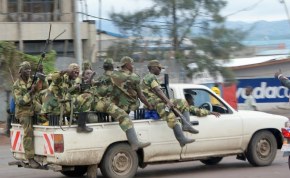 Photo: Radio Okapi
Photo: Radio Okapi
M23 rebel group entering the town of Goma.
Washington, DC — Press Statement by Marie Harf, Deputy Spokesperson, Office of the SpokespersonThe United States is alarmed by the escalating fighting between the M23 armed group and the armed forces of the Democratic Republic of the Congo (FARDC) in eastern Congo. We condemn the actions of the M23, which have resulted in civilian casualties, attacks on the UN peacekeeping mission (MONUSCO), and significant population displacements. We are also concerned by reports of shelling across the Rwandan border, including credible UN reports that the M23 has fired into Rwandan territory. We call on the M23 to immediately end the hostilities, lay down their arms, and disband, in accordance with UN Security Council resolutions.
We commend the actions of MONUSCO to protect civilians in and around Goma. Attacks against UN installations and personnel are unacceptable. We are deeply concerned about evidence of increasing ethnic tensions in Goma and call on all parties to avoid any actions that could exacerbate such tensions.
We urgently call on the DRC and Rwandan governments to exercise restraint to prevent military escalation of the conflict or any action that puts civilians at risk. We reiterate our call for Rwanda to cease any and all support to the M23 and to respect DRC's territorial integrity, consistent with U.N. Security Council resolutions and its commitments under the Peace, Security, and Cooperation Framework. We also call on the DRC to take all prudent steps to protect civilians and to take precautions that FARDC shells do not inadvertently land in Rwandan territory. We urge MONUSCO and the Expanded Joint Verification Mechanism to promptly and thoroughly investigate charges of cross-border shelling. We urge all parties to facilitate access for humanitarian organizations assisting populations in need.
The United States fully supports the Peace, Security, and Cooperation Framework signed by the DRC, Rwandan, and neighboring governments in February 2013 as the basis for a political dialogue to resolve the longstanding conflict in the region. We also believe any political settlement of the conflict must include accountability for human rights atrocities committed by leaders of the M23 and other armed groups, including the FDLR. The United States stands ready to consider further targeted sanctions against the leaders of the M23 and other armed groups and those who support them.
Congo-Kinshasa: Warring Parties in Eastern DR Congo Must Protect Civilians, UN Agencies Urge
24 August 2013United Nations humanitarian agencies in the Democratic Republic of the Congo (DRC) strongly condemned the attacks that killed and wounded a number of civilians today as fighting flared between Government and rebel forces near the eastern city of Goma, and urged the parties to "take all precautions" to avoid such acts, and to allow access to relief workers.
"I condemn all attacks causing deaths and injuries among the civilian population, and remind all parties to the conflict that the indiscriminate or deliberate attack against civilians is a war crime", said the UN Humanitarian Coordinator in DRC, Moustapha Soumare.
In a joint statement, Mr. Soumare, along with UN humanitarian agencies, including the UNICEF, High Commission for Refugees (UNHCR), the World Food Program (WFP) and the Office for Coordination of Humanitarian Affairs (OCHA) "strongly condemned the killing of innocent civilians by military strikes during the fighting between the Congolese Army (FARDC) and the M23 rebel group."
According to the statement, at least three people were killed and at five others wounded this morning when a shell landed in Ndosho, a suburb of the city of Goma, capital of North Kivu.
The agencies report that another shell fell on the same day near the Mugunga 3 internally displaced persons (IDPs) camp, home to more than 10,000 people. On August 22, numerous shells landed in residential areas of Goma, killing at least four people and wounding 15 - all civilians.
"The parties to the conflict must respect the inalienable rights of men, women and children to life. Civilians should not be targeted," said Barbara Bentein, UNICEF Representative in the DRC, who added that all forces and armed groups involved in the conflict must take care to protect the lives of all civilians in their entirety.
"More than 150,000 people have been displaced towards Goma since 2012. Goma is a place of refuge where the safety of civilians must absolutely be protected by the parties to the conflict," said Stefano Severe, UNHCR Regional Representative.
"International humanitarian law requires parties to the conflict to take all precautions to avoid exposing the civilians," he added.
"We are concerned about the humanitarian consequences of the fighting and call on the warring parties not only to spare civilians, but also to allow humanitarian access to populations in need," said Martin Ohlsen, WFP Representative in the DRC.
In light of several UN resolutions including Security Council resolution 1612 (2005) on children and armed conflict, and Security Council resolution 1325 (2000) on women, peace and security, UNICEF, UNHCR, WFP and OCHA remind all warring parties that they must protect civilians, the statement underscored.
Meanwhile, Martin Kobler, the head of the United Nations Stabilization Mission in the country (MONUSCO) also deplored the death of two civilians killed in demonstrations in Goma, and announced that a joint investigation will be carried out by the DRC Police (PNC) and the mission's Police Cell, UNPOL.

Congo-Kinshasa: UN Great Lakes Envoy Calls for Immediate End to Fighting in Goma
24 August 2013"Deeply concerned" by renewed armed clashes in eastern Democratic Republic of the Congo, as well as attacks on civilians and United Nations peacekeepers based there, the UN Special Envoy for the Great Lakes called today for an immediate end to the fighting and strongly urged all regional authorities to observe maximum restraint.
"The attacks on the town of Goma as well as on MONUSCO [UN Stabilization Mission] forces, and their tragic consequences on the civilian populations already traumatized by two decades of conflict, are unacceptable. They must stop immediately," said Mary Robinson, Special Envoy of the Secretary-General for the Great Lakes region of Africa, in a statement.
"We must do everything to avoid an escalation of tension in the region, promote dialogue, and respect the letter and the spirit of the Addis Ababa Peace, Security and Cooperation Framework for the Democratic Republic of the Congo and the region," Mrs. Robinson said, referring to the accord signed earlier this year by the Government of DRC along with 10 other countries and four regional and international institutions, which now serves as a blueprint for peace and development in the region.
"The renewed violence underscores, once again, the urgent need to rapidly find a political solution to the crisis," she said, noting that such a path would be in line with the Communiqué of the Summit of the International Conference on the Great Lakes Region, held in Nairobi on 31 July 2013, the informal Ministerial meeting held in New York on 25 July 2013, as well as the Communiqué of the recent SADC [Southern African Development Community] Summit held in Lilongwe, Malawi, on 18 and 19 August 2013.
"I strongly urge all authorities in the region to observe maximum restraint, to ensure that civilian populations are protected, and to minimize the risk of escalation of the situation," said Mrs. Robinson, adding that she is in close contact with all parties and continues to monitor the situation very closely.
"My Special Adviser is currently involved in consultations with relevant authorities in order to appeal for calm and restraint," she said.
Over the past year, the M23, along with other armed groups, have clashed repeatedly with the national forces (FARDC) in the eastern DRC.
The rebels briefly occupied Goma in November 2012. The fighting resumed in recent weeks, this time dragging in a group of Ugandan-based rebels, and displaced more than 100,000 people, exacerbating the region's ongoing humanitarian crisis, which includes 2.6 million internally displaced people (IDPs) and 6.4 million in need of food and emergency aid.

Congo-Kinshasa: Warring Parties in Eastern DR Congo Must Protect Civilians, UN Agencies Urge
24 August 2013United Nations humanitarian agencies in the Democratic Republic of the Congo (DRC) strongly condemned the attacks that killed and wounded a number of civilians today as fighting flared between Government and rebel forces near the eastern city of Goma, and urged the parties to "take all precautions" to avoid such acts, and to allow access to relief workers.
"I condemn all attacks causing deaths and injuries among the civilian population, and remind all parties to the conflict that the indiscriminate or deliberate attack against civilians is a war crime", said the UN Humanitarian Coordinator in DRC, Moustapha Soumare.
In a joint statement, Mr. Soumare, along with UN humanitarian agencies, including the UNICEF, High Commission for Refugees (UNHCR), the World Food Program (WFP) and the Office for Coordination of Humanitarian Affairs (OCHA) "strongly condemned the killing of innocent civilians by military strikes during the fighting between the Congolese Army (FARDC) and the M23 rebel group."
According to the statement, at least three people were killed and at five others wounded this morning when a shell landed in Ndosho, a suburb of the city of Goma, capital of North Kivu.
The agencies report that another shell fell on the same day near the Mugunga 3 internally displaced persons (IDPs) camp, home to more than 10,000 people. On August 22, numerous shells landed in residential areas of Goma, killing at least four people and wounding 15 - all civilians.
"The parties to the conflict must respect the inalienable rights of men, women and children to life. Civilians should not be targeted," said Barbara Bentein, UNICEF Representative in the DRC, who added that all forces and armed groups involved in the conflict must take care to protect the lives of all civilians in their entirety.
"More than 150,000 people have been displaced towards Goma since 2012. Goma is a place of refuge where the safety of civilians must absolutely be protected by the parties to the conflict," said Stefano Severe, UNHCR Regional Representative.
"International humanitarian law requires parties to the conflict to take all precautions to avoid exposing the civilians," he added.
"We are concerned about the humanitarian consequences of the fighting and call on the warring parties not only to spare civilians, but also to allow humanitarian access to populations in need," said Martin Ohlsen, WFP Representative in the DRC.
In light of several UN resolutions including Security Council resolution 1612 (2005) on children and armed conflict, and Security Council resolution 1325 (2000) on women, peace and security, UNICEF, UNHCR, WFP and OCHA remind all warring parties that they must protect civilians, the statement underscored.
Meanwhile, Martin Kobler, the head of the United Nations Stabilization Mission in the country (MONUSCO) also deplored the death of two civilians killed in demonstrations in Goma, and announced that a joint investigation will be carried out by the DRC Police (PNC) and the mission's Police Cell, UNPOL.
Congo: Rocket lands in Goma, kills 3 in new attack
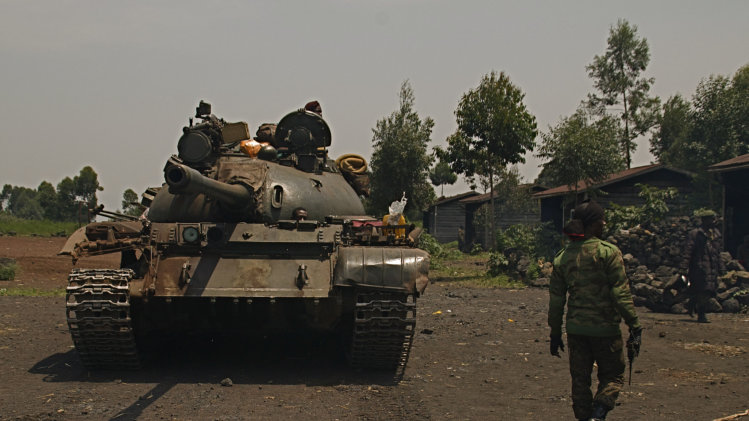
GOMA, Congo (AP) — Congolese soldiers supported by U.N. forces fought rebels in the country's volatile east for hours Saturday, officials said, while a rocket landed inside the town of Goma and killed three people as border tensions escalated between Rwanda and Congo.
Scores of angry residents took to the streets of Goma in protest following several days of violence that has left at least seven dead and dozens wounded in this city of nearly a million people near the Congo-Rwanda border.
Congo immediately blamed the rocket attack on neighboring Rwanda, which has long been accused of supporting the eastern Congolese rebel movement known as M23.
"We wonder, for how long will the international community continue to tolerate these offenses?" Lambert Mende, a spokesman for the Congolese government, told The Associated Press.
Rwanda, which has vigorously denied allegations by the United Nations and others that it
has provided support to the M23 rebels fighting the Congolese government, also accused Congolese forces of attacking Rwanda. The Rwandan army said mortar fire landed in several villages along the border on Friday.
Brig. Joseph Nzabamwita, a spokesman for Rwanda's military, said "acts of provocation that endanger the lives of Rwandan citizens will not remain unanswered indefinitely."
The M23 rebel group briefly took Goma last November and subsequent peace talks in neighboring Uganda have repeatedly stalled. M23's leaders previously headed other rebel groups in the region that were backed by Rwanda. The rebel group is made up of hundreds of Congolese soldiers mostly from the Tutsi ethnic group who deserted the national army last year after accusing the government of failing to honor the terms of a deal signed in March 2009.
Congolese officials and the U.N. confirmed on Friday that the new U.N. intervention brigade had shelled rebel positions on Thursday for the first time since the force was created in March.
Congolese army spokesman Col. Olivier Hamuli said that the fighting resumed around 5 a.m. Saturday and continued for at least seven hours.
The commander of MONUSCO, the United Nations peacekeeping force in Congo, said the mission was "completely engaged alongside the government army" and that a South African peacekeeper had been seriously wounded in the latest fighting.
New mission chief Martin Kobler, the U.N. secretary-general's special representative in Congo, told journalists Friday that the U.N. brigade will protect Goma. He said the U.N.'s objective in recent heavy fighting outside Goma was "to defend the town but also to eliminate the M23's positions."
A U.N. official, who spoke on condition of anonymity because details of the U.N. operation have not been made public, had said that Thursday's mission was a defensive operation to protect civilians and U.N. bases — not an offensive operation.
The intervention brigade, consisting of Tanzanian, South African and Malawian soldiers, was created by the U.N. Security Council in March and has deployed to Congo over the past few months, reinforcing 17,000 U.N. blue helmets already with MONUSCO. The brigade has a stronger mandate than past U.N. peacekeeping missions and is authorized to fight the rebel forces operating in eastern Congo.
There has been widespread skepticism in Congo that the intervention brigade will be a game-changing addition to the existing U.N. force, which stood by when M23 fighters briefly captured Goma late last year.
Main roads through Goma were blocked early Saturday by burning tires and crowds chanting anti-MONUSCO slogans.
Kobler, the U.N. mission chief, called on Goma residents to protect his staff after angry crowds tried to march on the mission headquarters there.
He said he understood people's impatience to see an end to rocket attacks "but the U.N. are not the enemy."
Mineral-rich eastern Congo has been destabilized by a myriad of armed groups since the aftermath of Rwanda's 1994 genocide when Hutu extremists blamed for the bloodshed fled to Congo.
___
Mwanamilongo reported from Kinshasa, Congo. Associated Press writers Krista Larson in Dakar, Senegal and Edith M. Lederer at the United Nations contributed to this report.
AU calls on members to provide more support to DRC and CAR
August 22, 2013 (KAMPALA) - The African Union (AU) has called on member states to provide more support to communities affected by violence in the Democratic Republic of Congo (DRC) and the Central African Republic (CAR).
The AU Peace and Security Council (AUPSC) made the call on Monday during its 391st sitting.
“The Council appealed to all AU member states to provide assistance to conflict-afflicted civilians in CAR and DRC”, said an AU statement released on 19 August to coincide with World Humanitarian Day which is held annually to mark the contribution of aid workers.
The AU’s call for more assistance for DRC and CAR came only a week after United Nations officials warned that the CAR poses a significant threat to peace in the Great Lakes region.
In March, president Francois Bozize was toppled by Seleka rebels, with the UN accusing the new government of failing to maintain law and order in the country.
The new government has also ordered the Ugandan army and its US supporters, currently hunting for the notorious leader of the Lord’s Resistance Army (LRA) rebels, Joseph Kony, to leave its territory.
The Ugandan army and 100 US soldiers sent to advise forces hunting for Kony subsequently suspended operations against the LRA, leading to fears the rebels, who are thought to be at their weakest, could regroup and again target the civilian population.
DRC on the other hand has had a long history of violence along its eastern borders, often leading to thousands of refugees fleeing to Uganda. In July, fresh fighting broke out in eastern Congo, forcing 66,000 refugees into Uganda.
Uganda complained that the refugees had put its resources under enormous stress and called on the DRC to resolve its internal problems.
In its recent sitting, the AU condemned the violence in eastern Congo and urged the warring parties to peacefully resolve their grievances
“The council condemned the escalation of fighting in the east of DRC and urged both government and armed opposition to conclude the peace talks under the auspices of the ICGLR ( International Conference on the Great Lakes Region) to facilitate restoration of stability in DRC and the return of the displaced population”, the AU said in a statement.
The AU also urged the international community to “provide and increase assistance towards emergency humanitarian needs and protection of refugees and Internally Displaced Persons (IDPs)” in CAR and DRC.
(ST)
Voice of America (Washington, DC)
Congo-Kinshasa: Troops, M23 Clash in DRC
22 August 2013 Photo: Radio Okapi
Photo: Radio Okapi
M23 rebel group entering the town of Goma.
Fresh clashes have erupted between and army and M23 rebels in the eastern Democratic Republic of Congo, following a three-week lull in hostilities.The unrest began late Wednesday outside of the flashpoint city of Goma and continued into Thursday.
Each side has blamed the other for starting the unrest.
Army spokesman Colonel Olivier Hamuli said the rebels launched the attack, but the army has the upper hand.
M23 spokesman Kabasha Amani said the unrest began after troops began massing near rebel positions and making small incursions.
The fighting marks the first major hostilities between the two sides since the army bombed the M23's headquarters in July and drove the rebels back several kilometers from Goma.
The M23 briefly took control of Goma last year and still controls parts of North Kivu province. The group has been fighting for political power and control of the region's rich mines.
The M23 is made up of former rebels who were integrated into the Congolese army in a 2009 peace agreement. However, the rebels later deserted the army, complaining of discrimination and poor treatment.





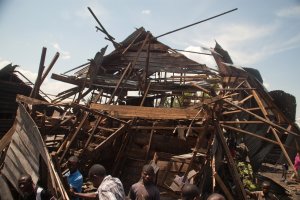
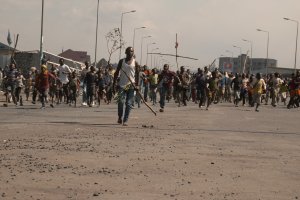

No comments:
Post a Comment